Why Ignoring SEO Could Hurt Your Small Business: Find Out the Critical Reasons!
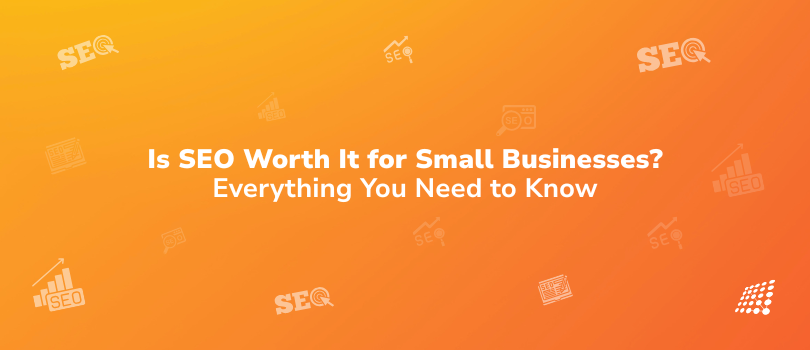
You've undoubtedly heard of SEO if you manage a small business, but you may be wondering if it's worth the time and money. It's normal to wonder if SEO is just another pricey marketing strategy or if it could truly transform your company's operations given your limited resources and never-ending to-do list.
The quick response? For small businesses, search engine optimization is definitely worthwhile, but only if you know what it takes and how to do it correctly.
Everything you need to know about SEO for small businesses will be covered in this guide, from the actual advantages to the possible drawbacks. In the end, you'll be able to tell if SEO is worthy of being included in your marketing plan.
Why Does SEO Matter and What Is It?
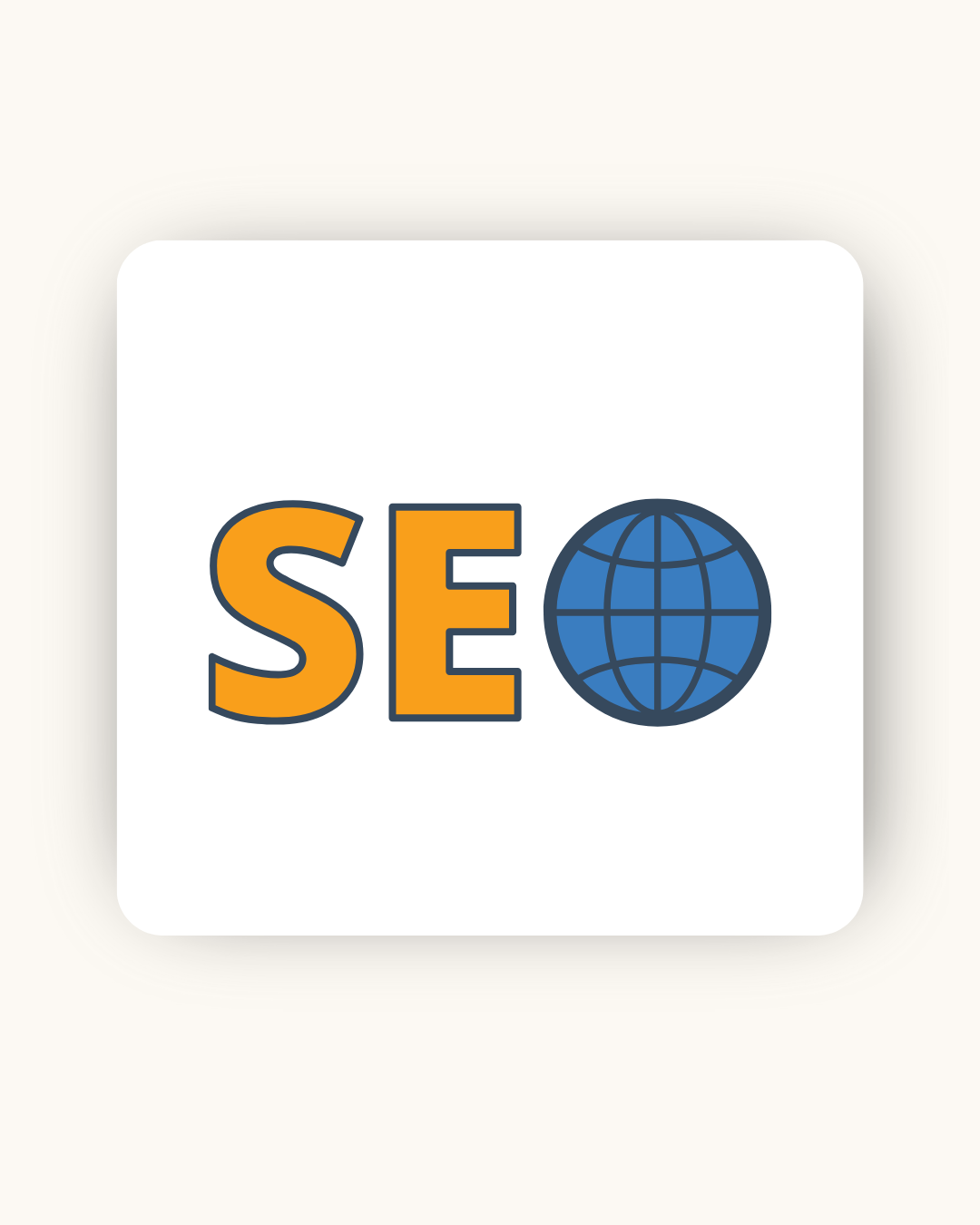
Enhancing your website and content to make it appear higher in search engine results when people are looking for goods or services similar to yours is known as search engine optimization, or SEO. Consider it as increasing the visibility of your company to prospective clients who are already looking for what you have to offer.
The problem is that your clients are already searching for answers online. In actuality, search engines are the first step in 68% of all online encounters. You want your company to appear among the first results when someone searches for "best coffee shop near me" or "affordable web design services."
Search visibility strategies help you get there without having to pay for advertisements each time a user clicks on your website.
How to Determine Whether SEO Is Beneficial for Your Company
Let's determine whether SEO makes sense for your particular business before delving into the advantages. These are two easy questions to ask yourself:
- Do customers look for your goods or services online?
- Do customers look up solutions to issues your company handles online?
SEO is worthwhile if you said "yes" to either question. If you said "no" to both, you might want to start by concentrating on other marketing tactics.
For instance, if you own a neighborhood eatery, people will undoubtedly look up "restaurants near me" or "best pizza in [your city]." People look up "emergency plumber" or "how to fix a leaky faucet" if you're a plumber. These are ideal chances for content optimization to introduce you to possible clients.
Seven Major Advantages of SEO for Small Companies
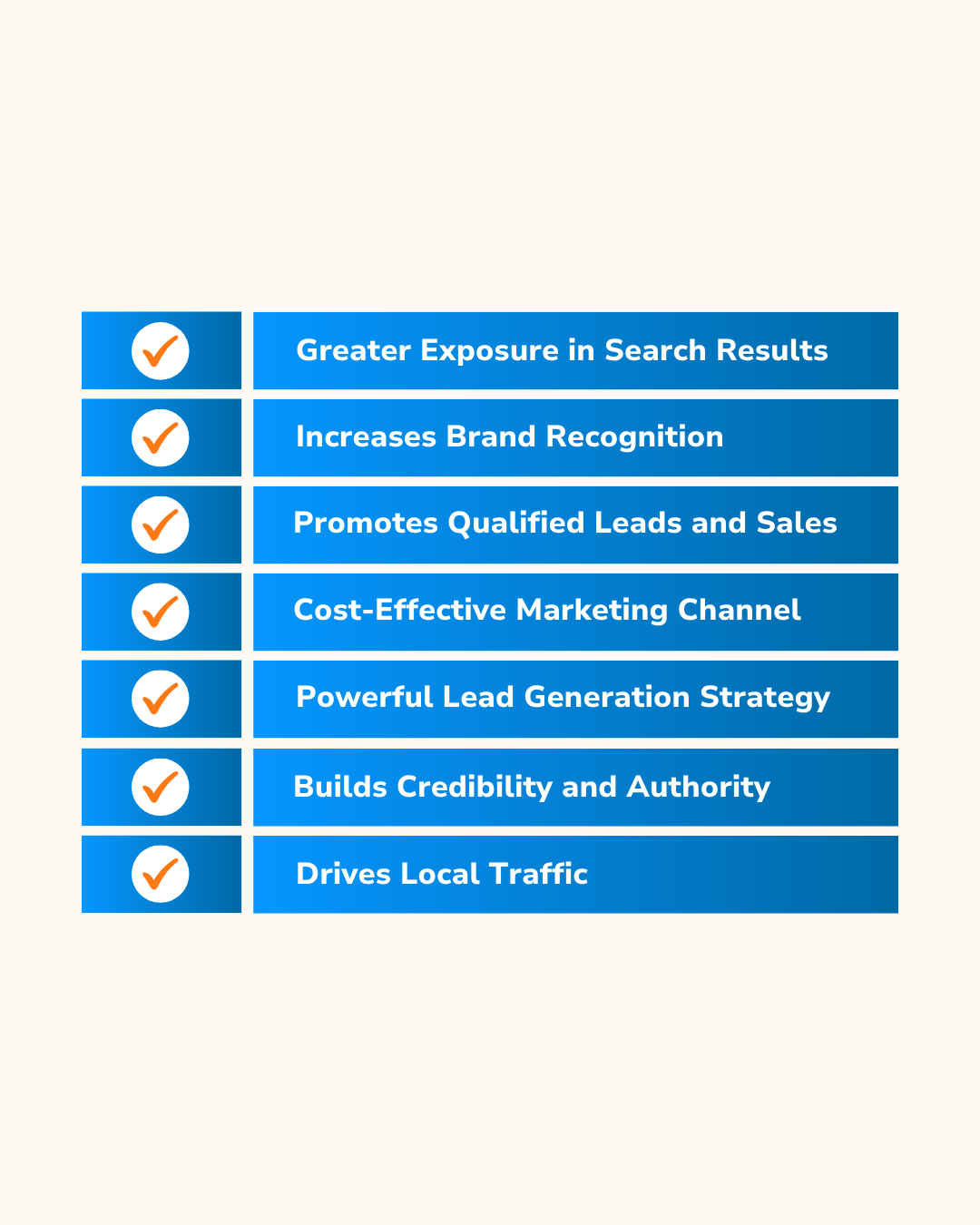
Let's examine the precise ways that SEO can support the expansion of your small business:
1. Greater Exposure in Search Results
- Increasing your company's visibility to more potential clients is SEO's greatest benefit.
- More people see your company, visit your website, and discover what you have to offer when you rank higher in search results.
Here's a compelling statistic: roughly 27.6% of all clicks on the first page of Google go to the top result. Ranking on the first page places you ahead of thousands of competitors who are buried on page two and beyond, even if you don't make it to the top.
2. Increases Brand Recognition
- You are increasing brand recognition each time a person sees your company in search results, even if they choose not to click.
- Through the creation of numerous touchpoints with your target audience, search engine marketing gradually increases brand familiarity and trustworthiness.
When consumers regularly see your coffee shop ranked for "specialty coffee blends," they start to think of you as the best option. Due to frequent exposure in search results, this brand association develops organically.
3. Promotes Qualified Leads and Sales
- Unlike other marketing methods that interrupt people, search ranking tactics attract customers who are actively looking for what you sell.
- These are high-quality leads because they've already expressed interest by searching for your type of business.
When someone searches "where to find the best espresso" and your shop appears first, you've gained a potential customer without spending money on ads. This organic traffic typically converts better than paid advertising because people chose to find you.
4. Cost-Effective Marketing Channel
- Most small businesses don't have huge marketing budgets, which makes optimization especially valuable.
- While there's an upfront investment in time or hiring help, SEO continues generating results long after you've done the work.
Compare this to paid advertising, where you pay for every single click and the traffic stops the moment you pause your campaigns. With search ranking tactics, a well-optimized blog post can bring in customers for months or even years.
5. Powerful Lead Generation Strategy
- SEO is good at lead generation because it targets people at different stages of the buying process.
- You can create content for people just starting to research solutions, those comparing options, and those ready to make a purchase.
For instance, someone researching espresso machines might first search for "benefits of espresso machines," then "best espresso machine brands," and finally "espresso machine store near me." SEO helps you capture leads at each stage.
6. Builds Credibility and Authority
- Ranking high in search results signals to customers that search engines trust your business.
- This creates an automatic credibility boost as people naturally assume that businesses on the first page of Google are more reputable and trustworthy.
Additionally, creating helpful, informative content establishes you as an expert in your field. The more valuable information you provide, the more customers view you as a reliable authority in your industry.
7. Drives Local Traffic
- If you run a local business, SEO is crucial for connecting with nearby customers.
“Research shows that 46% of all Google searches have local intent, and 97% of people have searched for local businesses online.”
Local SEO helps you appear when people search for services "near me" or in your city. This is especially important for service-based businesses, restaurants, retail stores, and other businesses that serve local customers.
Real Examples of SEO Success
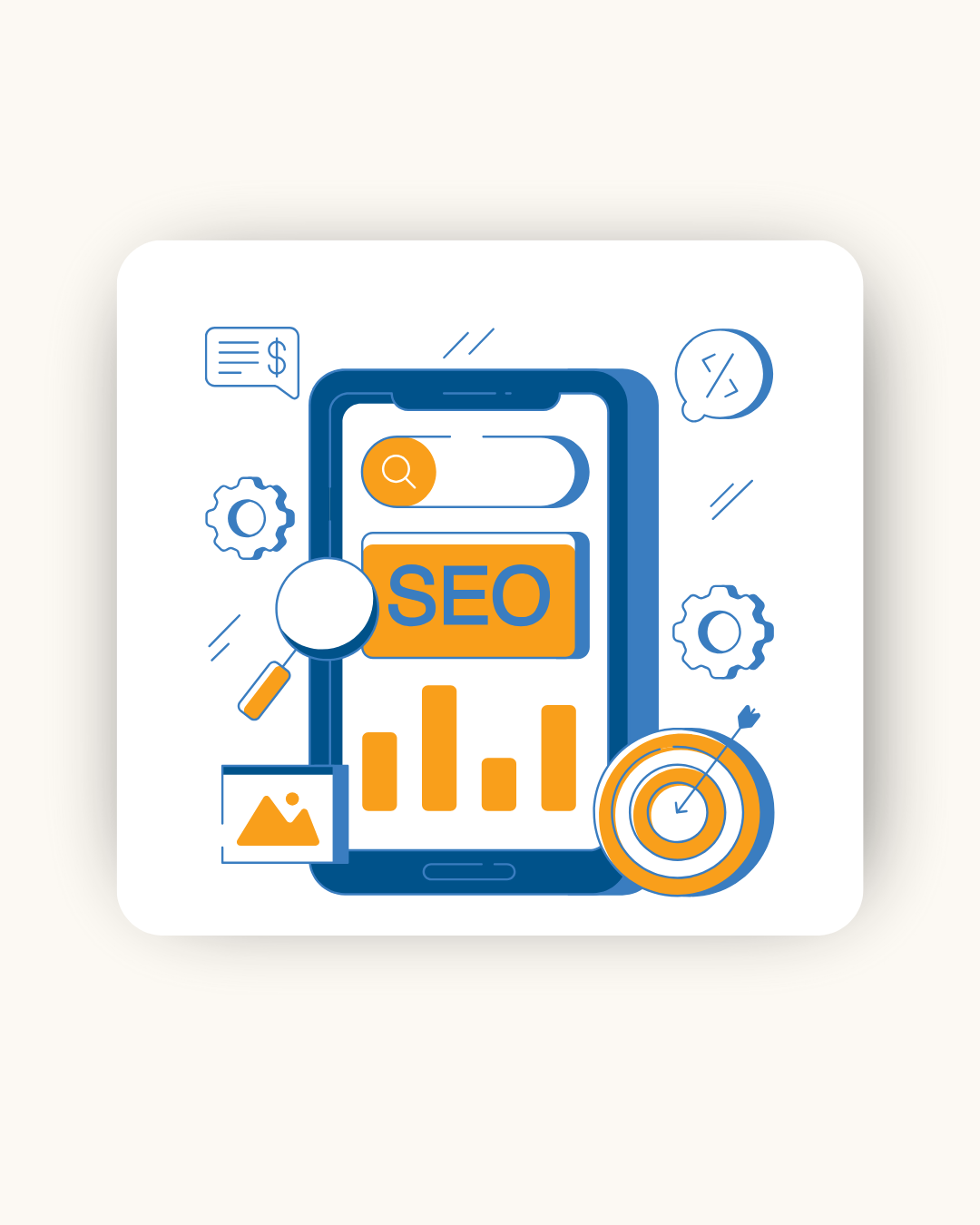
Here are some real-world examples that show SEO's impact on different types of businesses:
Recreation Industry: KOA Campgrounds
KOA, the well-known camping brand, used SEO to reach more families looking for outdoor getaways. Their results were impressive:
- 198% increase in organic transactions
- 260% increase in organic revenue
By optimizing for searches like "family camping" and "RV parks," they connected with their target market more effectively.
Healthcare: Merrimack Valley Psychological Associates
This practice, located in Massachusetts, used search visibility strategies to better serve their community and drive meaningful change. Their initiatives not only attracted more clients but also enabled them to grow and create new job opportunities.
Manufacturing: Great Northern
This B2B company concentrated on generating qualified leads through search engine marketing. They experienced a remarkable 103% increase in organic form submissions from potential clients by ranking for industry-specific keywords and crafting valuable content tailored to their target market.
The Challenges of SEO for Small Businesses
There are also challenges you need to be aware of:
Time to See Results
Improving search performance usually takes around 3 to 6 months. In some cases, it can stretch to 6 to 12 months before you start seeing real results. This timeline can be quite challenging for small businesses that are eager for quick wins or are dealing with tight cash flow.
However, once the strategies kick in, it works around the clock for your business. Unlike paid ads that stop delivering results when you pause your campaigns, effective search engine-optimized content keeps drawing in customers over time.
Constantly Changing Landscape
Search engines keep updating their algorithms. So what was a success for your website last year might not even register today. Stay alert and keep adjusting your strategies.
Requires Multiple Skills
Successful SEO blends content creation, technical knowledge, and data analysis. It also needs you to understand user experience. It can be overwhelming for small business owners who are already wearing multiple hats.
Is SEO a Long-Term Strategy Worth Pursuing?
Definitely! The real strength of SEO is how it builds up over time. Every piece of quality content you put out there boosts your online visibility and strengthens your website's authority. These efforts pile up, making it way simpler for people to find you when they’re searching for what you offer.
4 Common Concerns About SEO Investment
1. Financial Issues
Whether you handle SEO internally (staff time and tools) or with an agency (usually four to five figures per month), it does require investment. Nonetheless, companies that properly implement SEO usually see high returns on their investment.
As a general rule, you should anticipate receiving at least $2 for every $1 you spend on SEO. Particularly when their SEO efforts compound over time, some businesses see much higher returns.
2. Time to ROI
When you need results fast, the three to six month timeline may seem long. But keep in mind that SEO doesn't cost money per click once it starts to produce results.
3. Past Bad Experiences
Some businesses think search engine optimization has to do with outdated "black-hat" tactics (like keyword stuffing or buying fake backlinks). However, modern SEO focuses on white-hat practices that provide genuine value to users.
4. Skill Requirements
Technical optimization, content production, and data analysis are just a few of the abilities needed for success. If this seems too much to handle, think about working with a respectable SEO consultant or agency.
How to Measure SEO Success
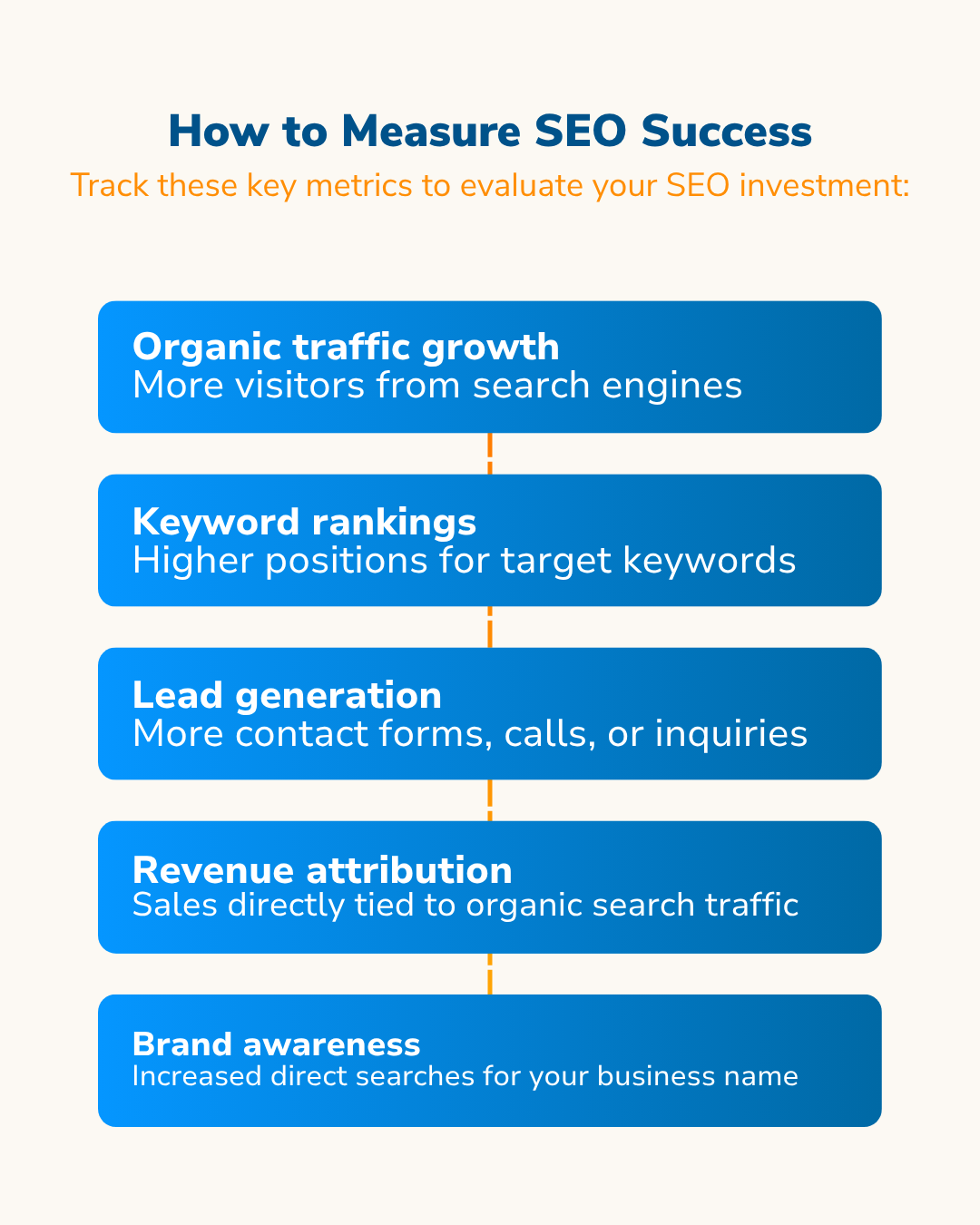
Making the Decision: Is SEO Worth It for Your Business?
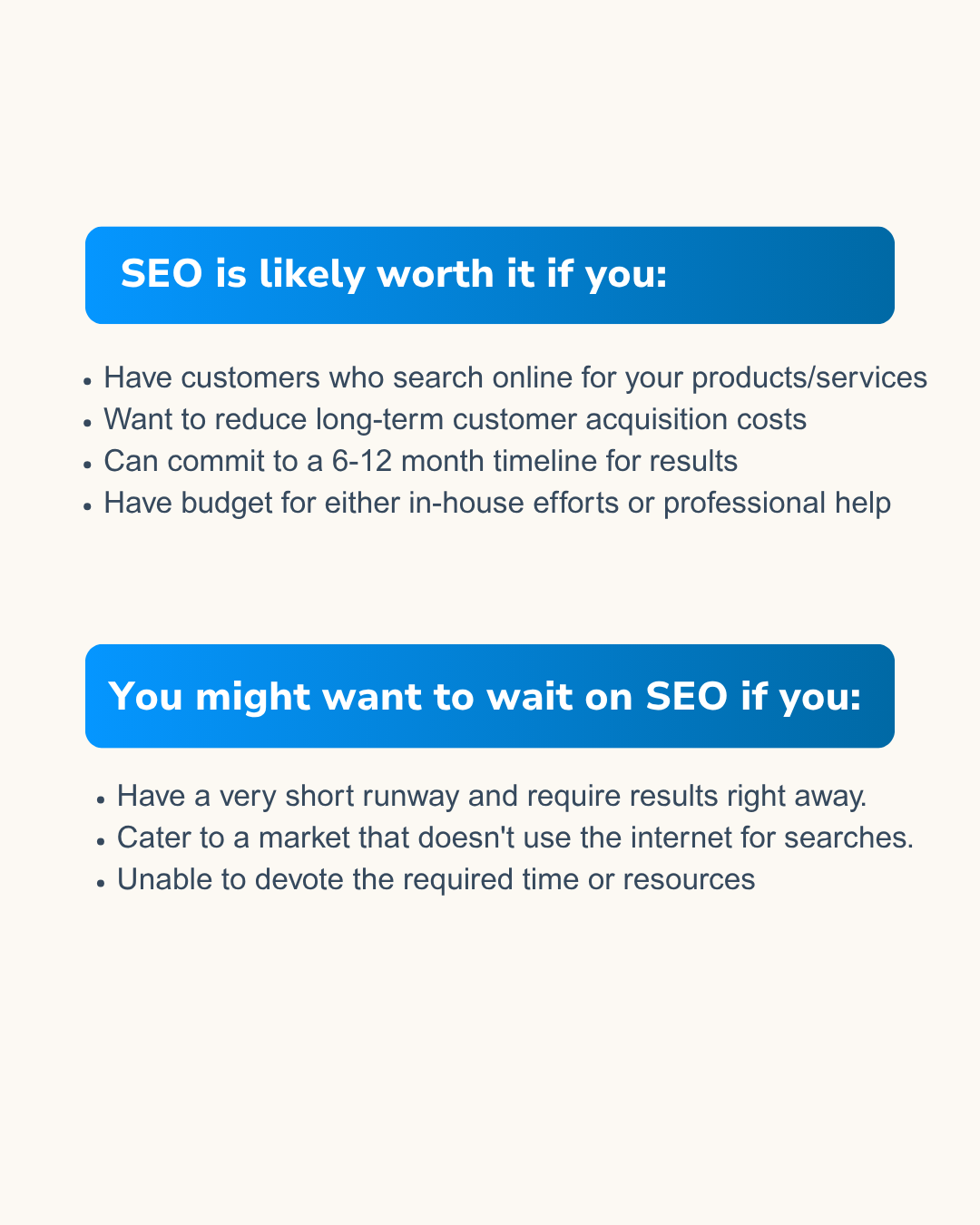
SEO is a wise choice for most small businesses, but it depends on your specific situation.
Keep in mind that you are not forced to choose between SEO and other marketing tactics. SEO serves as the cornerstone of many prosperous small businesses, which then add paid advertising, social media, or other strategies for faster results.
FAQs About SEO for Small Businesses
Is SEO really worth it for small businesses?
Honestly? If your customers are Googling things like "plumber near me" or "best coffee shop downtown," then yes, SEO is absolutely worth it. Think about it – when was the last time you looked past the first page of Google results? Your customers don't either.
The catch is you need to be realistic. SEO isn't a magic wand that transforms your business overnight. But if you stick with it and do it right, it's like having a steady stream of customers who already want what you're selling.
How much should a small business spend on SEO?
This is like asking "how much should I spend on a car?" It depends on where you're going and how fast you want to get there.
Most small businesses spend between $500 and $5,000 per month. I know that sounds like a huge range, but it really depends on your competition. If you're a local bakery, you might start with $500. If you're competing with big chains, you'll need more firepower.
My advice? Start small and grow as you see results. Don't blow your entire marketing budget on month one.
How long does it take to see SEO results for a small business?
I wish I could tell you "two weeks," but I'd be lying. Most businesses start seeing some movement in 3-6 months. Real, game-changing results? That's usually 6-12 months out.
I know it feels like forever when you're waiting for customers, but remember – once it starts working, it keeps working. It's like building a snowball that eventually becomes an avalanche.
Can I do SEO myself or do I need to hire someone?
You can definitely start on your own, especially if money's tight. There are tons of free resources online, and honestly, some of the basics aren't rocket science.
But here's the thing – SEO has gotten pretty complex. It's part tech work, part writing, part psychology. Most business owners I know get overwhelmed trying to do it all themselves. Once you're making some money from it, hiring someone who lives and breathes this stuff usually makes sense.
What's the difference between SEO and paid advertising for small businesses?
Think of paid ads like renting customers – you pay, they come, you stop paying, they disappear. SEO is more like buying the building. It takes longer to pay off, but eventually, you own something valuable.
The smartest businesses I work with do both. Use ads to get customers today while building your SEO foundation for tomorrow.
How do I know if my SEO is working?
You'll know. More people will find your website. Your phone will ring more often. You'll start showing up when people search for what you do.
Google Analytics is your friend here – it's free and shows you exactly where your visitors are coming from. If you see that "organic search" number growing month after month, you're on the right track.
What are the biggest SEO mistakes small businesses make?
The biggest one? Expecting instant results and giving up too soon. SEO is like going to the gym – you won't see abs after one workout, but stick with it for six months and you'll be amazed.
Other mistakes I see all the time: keyword stuffing (your content should sound human, not robotic), ignoring local search (huge mistake for local businesses), and creating content that's boring or unhelpful. Google rewards websites that actually help people.
Is local SEO important for small businesses?
If you serve customers in your area, local SEO isn't just important – it's everything. Nearly half of all Google searches are people looking for something nearby.
Think about it: when someone searches "pizza near me" at 8 PM on a Friday, you want to be the first name they see. That's local SEO in action. Make sure your Google Business Profile is complete, ask happy customers for reviews, and create content that mentions your neighborhood. It's often easier to rank locally than nationally, so it's a great place to start.
The Bottom Line: SEO Is Worth the Investment
Look, I get it. As a small business owner, you're probably tired of hearing about the "next big marketing thing." But here's the truth about SEO – it's not flashy, it's not quick, but it absolutely works.
Here's what really happens when you stick with SEO: people start finding you when they actually need what you sell. Your phone rings more. Your website gets visitors who aren't just browsing – they're ready to buy. And the best part? You're not paying for each click like you do with ads.
I won't sugarcoat it – SEO takes time. We're talking months, not weeks. But once it kicks in, it's like having a 24/7 salesperson who never takes a sick day.
And here's something that might surprise you: your biggest competitor down the street is probably already doing this. While you're debating whether SEO is worth it, they're quietly climbing up Google and snagging customers who could have been yours.
You don't need to become an SEO expert overnight. Start simple: make sure people can find you when they search for businesses like yours in your area. Write about the problems you solve for customers. Keep track of what's working.
The small steps you take today will pay off in ways you can't even imagine yet. Your future self will thank you for starting now.

Implementing edit records in multiple associated tables in Cakephp 3

THE MODERN TOOL: CYPRESS


